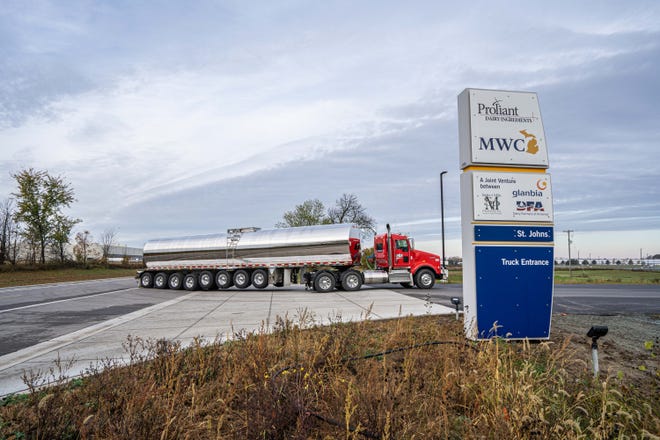
The operation includes two facilities:
MWC, a $470 million cheese plant, is a joint venture between Irish food-and-nutrition company Glanbia and two large dairy cooperative investors, the Dairy Farmers of America and Select Milk Producers. It will make cheese and whey.
An adjacent $85-million facility belonging to Proliant Dairy Ingredients will dry permeate, a byproduct of the whey from the milk processed at MWC, into powdered dairy solids used in making baked goods, confectionery products, beverages and animal feed.
Processing at MWC will gradually “ramp up” over the next eight months, Martha Kavanagh, a spokesperson for Glanbia, said Wednesday.
On Tuesday, MWC took in 1 million pounds of milk from dairy farms. Within the next eight months that will increase to an estimated 8 million pounds of milk each day, she said.
Proliant is expected to begin receiving permeate from MWC in about a week, according to a news release from Glanbia.
By next summer MWC will employ approximately 260 people. Just under 190 of those jobs have already been filled, Kavanagh said.
The remaining jobs will be filled in phases, with new-hire orientations the first week of every month from November through February, she said.
Glanbia officials are optimistic the COVID-19 pandemic won’t slow production plans at the state-of-the-art operation, she said, though they’ll hold off on a grand opening celebration for now.
“Leadership have factored safety protocols into the commissioning process,” Kavanagh said.
A ‘bright spot’ for the state’s dairy farmers
News that milk processing is underway at MWC is a “bright spot” for the state’s more than 350 dairy farmers, said Ken Folkema, who runs a 2,000-acre farm in Fremont, two hours away.
The daily operation’s construction has been underway for nearly two years and dairy farmers have been anxious for processing to start, he said.
Michigan’s dairy farmers have had few options for milk processing in the state. MWC will save producers money in transportation costs, Folkema, 61, said Wednesday.
“It’s absolutely fantastic because it gives you the hope of what we were looking forward to even before the pandemic,” he said. “This is just going to open the door for more opportunities for Michigan dairy producers.”
MWC’s opening comes at a time when dairy farmers have been grappling with the rise and fall of milk prices and drastically changing market demands attributed to the pandemic, said Heather McCann, director of public affairs for Dairy Farmers of America.
Dairy farmers who supply milk to grocery stores spent the spring dealing with a surge in demand, McCann said, while farmers who supply milk for the restaurant and hospitality industries saw those operations halted or stagnated, she said.
“The industry has faced a tremendous amount of challenges,” McCann said.
The expectation, she said, is that Michigan farms will supply the milk processed at MWC.
“There’s plenty of milk in Michigan to keep that plant full and that is our intent,” McCann said.
Safety protocols in place amid pandemic
Work at MWC started this week with strict safety protocols in place, Kavanagh said.
Employees must wear personal protective equipment on the job. Social distancing measures are in place, Kavanagh said, and there is “heightened sanitation” at the operation, along with limits on who is allowed to enter the property.
In May, Kavanagh said the operation’s construction “experienced some delays in March because of supplier disruptions in some areas,” but it didn’t prevent the operation from opening this month.
Roughly 800,000 pounds of American-style cheddar, Monterey Jack and Colby Jack cheeses will be made at MWC every day by July of 2021. Most of it will be cut into 40-pound blocks, packaged and shipped to retailers and food service and ingredient companies.
Whey, a liquid of protein, lactose and water that remains when making cheese, also will be produced. MWC will process it into whey protein concentrate and whey protein isolate, according to a Glanbia news release.
Both are dairy protein powders used by sports nutrition companies and other food and beverage manufacturers in products including protein bars, fortified beverages and sports nutrition products.

























